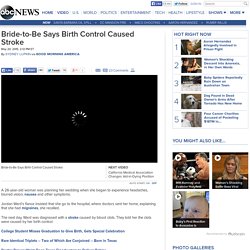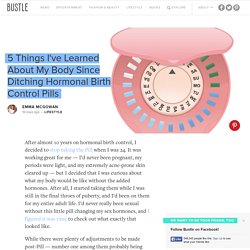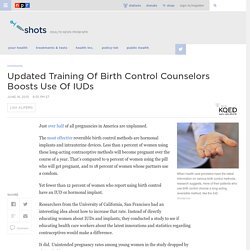

A Birth Control Pill for Men Is One Step Closer to Reality. Long-acting birth control may return to favor. Emily Needles, 28, has been to four weddings in the past year, with two more this summer.

Her own wedding date is set for May. Soon, it will be time for baby showers. She's all for the celebrations, as long as they are not for her baby, yet. Needles, who lives in Elkton, Maryland, is in a serious relationship, but she and her significant other are not planning on any bundles of joy any time soon, if at all. "I want to think about this longer and want to make sure I am protected in the meantime," Needles said.
Having that kind of peace of mind resonates with most women not yet ready to have a family. Bride-to-Be Says Birth Control Caused Stroke. A 26-year-old woman was planning her wedding when she began to experience headaches, blurred vision, nausea and other symptoms.

Jordan Ward's fiance insisted that she go to the hospital, where doctors sent her home, explaining that she had migraines, she recalled. The next day, Ward was diagnosed with a stroke caused by blood clots. They told her the clots were caused by her birth control. "When I did get the news, I was in shock," Ward told ABC's Los Angeles Station, KABC. "I'm 26 years old. " Young Republicans Support Affordable Birth Control, Favor Pills Over Emergency Contraception. Young Republicans may be departing from their parents' -- and party's -- views on birth control.

Two-thirds of Republicans ages 18 to 34 said they thought women should be able to get affordable birth control, according to a survey released Tuesday by the National Campaign to Prevent Teen and Unplanned Pregnancy. A majority of conservative millennials told researchers they had a positive opinion of birth control, and though 60 percent had a negative opinion of the Affordable Care Act in general, 43 percent supported the federal law's controversial contraception mandate. States Lead Effort to Let Pharmacists Prescribe Birth Control. Photo Groundbreaking laws in two Western states will soon make access to birth control easier for millions of women by allowing them to obtain contraceptives from pharmacists without a doctor’s prescription.

Even as the Supreme Court prepares to consider another divisive case involving access to , public health advocates hope these arrangements could spread across the country, as states grappling with persistently high rates of unintended pregnancy seek to increase access to birth control with measures that so far have been unavailable under federal law. Most Western countries require a doctor’s prescription for hormonal contraceptives like pills, patches and rings, but starting sometime in the next few months, women in California and Oregon will be able to obtain these types of birth control by getting a prescription directly from the pharmacist who dispenses them, a more convenient and potentially less expensive option than going to the doctor. Dr. Colorado’s Effort Against Teenage Pregnancies Is a Startling Success. The surge in Colorado has far outpaced the growing use of such methods nationwide.

About 7 percent of American women ages 15 to 44 used long-acting birth control from 2011 to 2013, the most recent period studied, up from 1.5 percent in 2002. The figures include all women, even those who were pregnant or sterilized. The share of long-acting contraception users among just women using birth control is likely to be higher. Photo But the experiment in Colorado is entering an uncertain new phase that will test a central promise of the Affordable Care Act: free contraception. The private grant that funds the state program has started to run out, and while many young women are expected to be covered under the health care law, some plans have required payment or offered only certain methods, problems the Obama administration is trying to correct.
5 Things I've Learned About My Body Since Ditching Hormonal Birth Control Pills. After almost 10 years on hormonal birth control, I decided to stop taking the Pill when I was 24.

It was working great for me — I’d never been pregnant, my periods were light, and my extremely acne-prone skin cleared up — but I decided that I was curious about what my body would be like without the added hormones. After all, I started taking them while I was still in the final throes of puberty, and I’d been on them for my entire adult life. Colorado’s Effort Against Teenage Pregnancies Is a Startling Success. Updated Training Of Birth Control Counselors Boosts Use Of IUDs. When health care providers have the latest information on various birth control methods, research suggests, more of their patients who use birth control choose a long-acting reversible method, like the IUD.

iStockphoto hide caption itoggle caption iStockphoto Just over half of all pregnancies in America are unplanned. The most effective reversible birth control methods are hormonal implants and intrauterine devices. Contraceptive_methods_508.pdf. Birth Control Archives - Sex, Etc. My Experience on the Birth Control Implant - Sex, Etc. The combined pill - Contraception guide. The combined oral contraceptive pill is usually just called "the pill".

It contains artificial versions of the female hormones oestrogen and progesterone, which women produce naturally in their ovaries. A woman can get pregnant if a man’s sperm reaches one of her eggs (ova). Contraception tries to stop this happening by keeping the egg and sperm apart or by stopping egg production. Teaching assistant, 21, 'killed by contraceptive pill' Teaching assistant Miss Kurek was prescribed Rigevidon by her GP to regulate her periods and told to take the pill for three months. • Blood clot warning for 1m contraceptive pill users But after just three weeks of taking the contraceptive, she began suffering with breathlessness and pains in her legs and ribs.

Her worried father Brian, 52, took her to Sir John Peel Hospital in Tamworth for a check-up where she was given an electrocardiogram (ECG) but four days later she began getting breathless again and collapsed on the stairs of her home. Brian and Julia Kurek from Tamworth holding a picture of their daughter Fallan (BPM) Teaching assistant, 21, 'killed by contraceptive pill' Is the contraceptive pill safe? What are the risks? Following our story of the tragic death of 21-year-old Fallan Kurek, who after taking the contraceptive pill, we have pulled together the latest information on the risks of taking the combined pill or progestogen-only pill below.

Read Fallan's heartbreaking story here This advice is taken from the NHS Choices website - which has more advice on contraception methods here Risks of taking the combined pill There are some risks associated with using the combined contraceptive pill. However, these risks are small and, for most women, the benefits of the pill outweigh the risks. Blood clots. IUDs and Implants Recommended for Teens, but Difficult to Access.
The nation's leading pediatrics group said this week that intrauterine devices and implants should be the first option for teen girls who are having sex – a notable update to its previous birth control guidelines that specified only condom use. But although the devices are effective, safe and endorsed by most medical groups, teens trying to get them can face hurdles, from their cost to the stigma attached to adolescent sexual activity. "We as a society need to work to reduce those barriers and help teens to prevent pregnancy more effectively," says Dr. Eve Espey, former chairwoman of the American College of Obstetricians and Gynecologists' Committee on Health Care for Underserved Women.
The academy's statement encourages pediatricians to include abstinence as part of contraceptive counseling, advising teens to delay sex until they are ready. The advice comes as a heated debate over contraception continues to unfold in the political and legal arenas. Bedsider Birth Control Support Network. When The Economy Goes Down, Vasectomies Go Up. Did worries about financial stability get more men to say no to fatherhood? iStockphoto hide caption itoggle caption iStockphoto. Study: Insurers Fail To Cover All Prescribed Contraceptives. Will the health plan pay for the contraceptives the doctor prescribes? MediaforMedical/Emmanuel Rogue/Getty Images hide caption itoggle caption MediaforMedical/Emmanuel Rogue/Getty Images Will the health plan pay for the contraceptives the doctor prescribes? MediaforMedical/Emmanuel Rogue/Getty Images Some women may be paying hefty fees for birth control pills, vaginal rings and emergency contraception, despite a federal requirement that insurers pay their full cost.
The analysis looked at 20 health insurers in five states and found companies that provided limited or no coverage for some forms contraception. TROJAN™ Double Ecstasy™ How Likely Is It That Birth Control Could Let You Down? Misuse and failure of birth control are major contributors to the millions of unplanned pregnancies in the United States each year. When failure rates of contraceptives are mentioned, they usually refer to a given year of use.
Less understood is that the risk of failure is compounded over time. The longer any method of contraception is used, the greater the probability of unplanned pregnancy — the same way that any small risk, taken repeatedly, grows in likelihood.